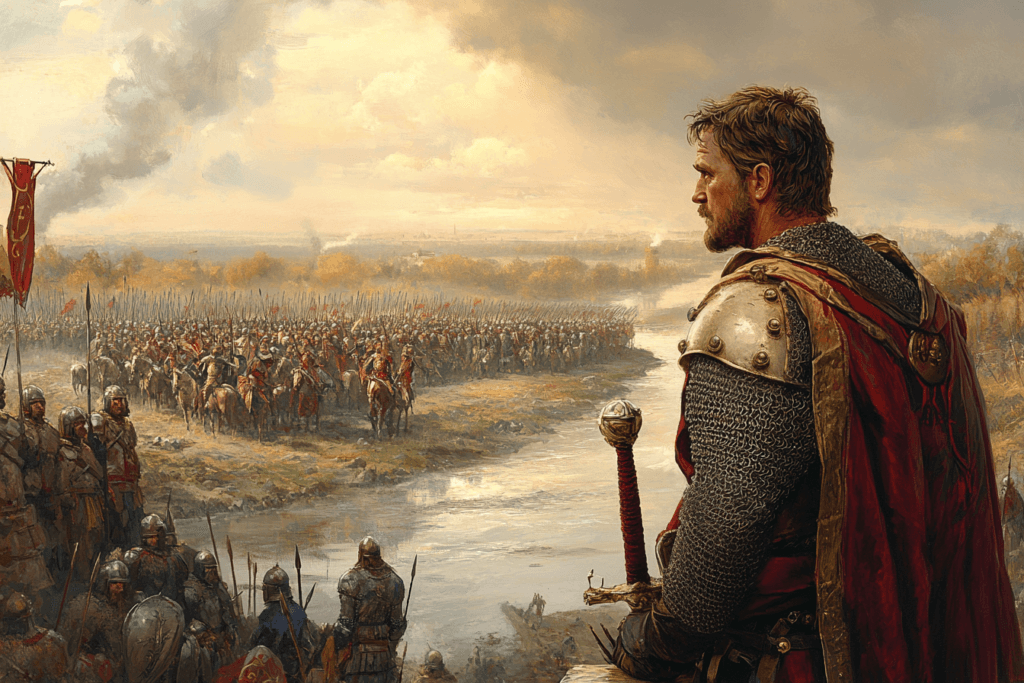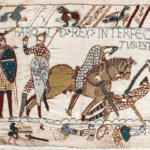
If England had won, not lost, the Hundred Years’ War, the trajectory of English, French, and broader European history would have been radically transformed in both the short and the long term. Such a victory would have established an Anglo-French union under a single monarchy, reshaping political, cultural, and economic realities across the continent. This scenario is rife with intricate consequences – one for history enthusiasts to ponder!
The Immediate Aftermath: A Dual Monarchy
In this alternate reality, an English victory would mean that the monarch of England also wore the crown of France – likely secured by continued military success after Agincourt and the longevity of King Henry V. Paris and London might have become twin capitals of a massive unified realm, stretching from the Scottish border to the Pyrenees and beyond. However, the reality is that France was four times the size of England at the time, totally dominant in population, size and resources, so culturally would surely have dominated any union of the two states, especially with the ruling Norman elite being French speakers.
- The bureaucracy would merge: French and English nobility, while united on paper, would immediately compete for influence and resources.
- The English language, still influenced by Norman French, might have fused much sooner with French, creating a new elite lingua franca by the time of the Renaissance. However, it would probably be more French than English. Anglo-Norman kings spoke French for centuries after 1066, with Henry IV being the first English monarch to speak English as a first language in 1399. This transition was a long process, influenced by the gradual decline of French as the language of the nobility, which was accelerated by the loss of Normandy in 1204, and the subsequent rise of English as a practical and legal language in the 14th century. Perhaps French, with four times as many speakers as English at the time, would have eventually have replaced English as it did Occitan which was the predominant language of southern France at the time of the Hundred Years War.
- English and French systems of law, taxation, and social structure would clash, sparking constant negotiations and sometimes outright unrest.

Political Unrest and the Limits of Unity
Forming a mega-kingdom would not quiet centuries of mutual suspicion between English and French elites. In fact, governance might have become more, not less, fractious in the short term.
- The privileges of French regional nobility would confront the centralized ambitions of English kings.
- Burgundy, Brittany, and Gascony would tense up, as local rulers wary of new power-sharing might ally with external rivals – Spain, the Holy Roman Empire, even Scotland – to challenge English rule.
- The complex web of feudal loyalties, already under strain by war, would likely snap during any royal minority or succession crisis.
Averting the Wars of the Roses
One immediate, if unpredictable, impact would be the likely prevention – or radical alteration – of the Wars of the Roses. The Yorkist and Lancastrian branches fought over the English throne largely because of dynastic weakness after losing France. With continental resources, and a prestigious dual crown, Plantagenet or early Tudor rulers might command far greater authority.
- English nobles would be too busy vying for French spoils and positions to launch massive civil wars back home.
- The English Parliament, strengthened in our reality by holding the king fiscally accountable for war failures, might never acquire its distinct “loyal opposition” identity.

A Different Nationalism
National identity, as it was forged in mutual antagonism during and after the Hundred Years’ War, would look dramatically different. At the outbreak of the War
- The modern idea of “England” as distinct from “France” would never crystallize as it did.
- An “Anglo-French” identity – multilingual, multicultural, and perhaps more cosmopolitan – could become the norm at least among elites. French would surely have continued to be the of the ruling elite in England.
- Joan of Arc, national hero of France, would never be canonized; likewise, Henry V might become not just an English but a pan-French royal icon.
Effects on the Renaissance and Reformation
The union of England and France, dominating trade routes, educational centers, and artistic patronage, would drastically affect Europe’s intellectual revival in the 15th and 16th centuries.
- The great universities of Oxford, Paris, and Cambridge would exchange far more students and ideas.
- The patronage of the arts – already thriving in both realms – could have made this dual monarchy the epicenter of the European Renaissance.
- The early Reformation, which found fertile ground in a politically isolated England, might have spread further into southern Europe if backed by a far stronger England. Or, the Reformation might have faced united Catholic resistance from the vast Anglo-French bloc.
Continental Power Politics and Colonial Empires
England’s victory would alter the gameboard of European alliances forever.
- Spain and the Holy Roman Empire, threatened by a massive Anglo-French state, would ally earlier in self-defense, shaping the map of future wars.
- The Habsburgs’ subsequent rise might be curtailed or redirected, possibly leading to more direct confrontation earlier between “Anglo-French” power and Central/Eastern Europe.
- Overseas expansion, already underway from both England and France, could be massively accelerated. Instead of rival colonies, a unified effort could project more power into Africa and the Americas.

Socio-economic Ripple Effects
With two of Europe’s richest agricultural and commercial regions united, economic development would rocket – at least initially.
- Continental trade would be dominated by Anglo-French merchants; the wool and wine trade, in particular, would remain tightly linked.
- Urban growth in London, Paris, and Bordeaux could outpace all contemporaries outside of Italy, developing mega-cities centuries early.
- The greater resources would support standing armies, further diminishing the power of the old feudal aristocracy, and increasing the power of the English king.
Religion and the Church
The Church faced crisis and adaptation during the war; in victory, a unified (likely Catholic) Anglo-French church might exert outsized influence on the Papacy.
- The Western Schism (1378–1417) might resolve differently, with two-country pressure dominating papal politics.
- Later religious reformers like Wycliffe and, eventually, Luther might face more systematic suppression, the sheer power of the Anglo-French monarchy making dissent dangerous. Although had Henry VIII still forced a break with Rome to enable his divorce there would have been even less the Pope could do about it.
Language and Culture
- The English language, still heavily influenced by Norman French, might merge more thoroughly with continental French into a hybrid administrative and literary language, especially considering how many more French than English speakers there would have been in this unified kingdom.
- Chivalric culture, as idealized by Edward III and Henry V, might spread more rapidly, influencing codes of conduct across a larger elite.
Long-Term Fragility
The dual monarchy’s greatest weakness would be its sheer scale and internal complexity.
- Centralization attempts would meet repeated resistance from independent-minded French and English local rulers.
- If the monarchy were perceived as favoring one core region over the other – say, appointing only Englishmen to rule in Paris or vice versa – rebellions would be constant risks.
- Over time, as was seen in other historical unions (such as the Kalmar or Austro-Hungarian unions), real or perceived inequality could split the realm. Scotland, Iberia, Flanders, and Burgundy would all be more likely to intervene in civil conflicts.
The Breakup Scenario
Even if the union persisted for 2–3 generations, eventual division was always likely.
- The most likely causes: dynastic crisis (say, both England and France having rival claimants), or local revolts feeding off external support from rival European powers.
- If a breakup did occur in the late 15th or early 16th centuries, both realms would emerge changed: England potentially more “continental” in culture and language, France with a more Anglicized elite and state apparatus.
Global Consequences
If the union survived until colonization began in earnest, the world map would look fundamentally different by the 18th century.
- North America would not be divided not into British and French colonies but into a single “Anglo-French” imperial zone, rivalled only by Spain and Portugal.
- The lack of centuries of enmity might even avoid the globalizing wars of the 18th century (like the Seven Years’ War), though new conflicts would surely arise as power centers shifted.

In short, had England won the Hundred Years’ War, Europe would have seen the emergence of a superstate at the heart of Western Christendom. The cultural, linguistic, and political barriers that came to define modern national identities would be blurred if not erased at elite levels. While the union might be unstable and prone to dramatic ruptures, its influence – on everything from Parliament to Renaissance art to global colonialism – would echo strongly through the ages.




